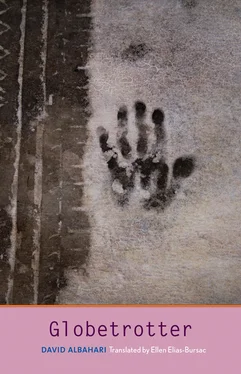We went to Lloyd Hall, veering around three little dark mounds, which we were convinced were three slumbering deer, and went up to Daniel Atijas’s room. By then we were very drunk, we staggered and propped each other up, and later, when Daniel Atijas took an unopened bottle of whiskey from his suitcase and placed it on the table, the night turned into a series of fragments with blunt edges between which there were blanks. I woke up in my room on the floor by the bed, fully dressed. I didn’t know how I’d gotten there, how I’d left Daniel Atijas’s room, what had happened to Ivan Matulić’s grandson. All I knew was that every movement, even the slightest, made my head fall to pieces and then, in some magnificent way, reassemble itself. The red light on the phone was blinking, a sign that someone had been looking for me and, not having found me, had left a message. I thought, of course, of Daniel Atijas, then of the grandson, and then, though I tried to fend it off, of Mark Robinson and the director of the Literary Arts Programs, but I could not bring myself to press anything, even the telephone receiver, to my temple, though if I had rested the phone on one of my big ears my ear would have held it far enough away from my skull for comfort. The light blinked, and slowly, as if in a slow-motion film, I moved from lying down to sitting. I rested for a moment and then managed to stand, though only for a second, because I had to sit right down again on the edge of the bed.
If someone had suggested just then that I should lean over and look under the bed, I thought, I would have punched him so hard that I would have knocked all his teeth down his throat. This was pure exaggeration, for there was no way I could even lift my arm, let alone get the momentum going or direct a blow to a specific spot. But suddenly I thought that maybe this was exactly what I should be doing, that I ought to lean over and look under the bed. If I had turned up next to the bed without knowing how I’d gotten there, mightn’t there be someone underneath it? The light kept blinking in closer and closer sync with the pain pulsing in my temples, the back of my head, my neck, and it made no difference at all whether I was watching it or had squeezed my eyes shut. Slowly, quite slowly, I crouched, then kneeled with my palms on the rug. When I tried to bring my head to the floor, keeping my balance by thrusting my bottom into the air, the blood rushed so violently into my temples that it nearly toppled me over. There was no way around it: I had to lie back down. Some people are so destined, I said later to Daniel Atijas, no matter what they do, no matter how hard they try, to always end up at the beginning. Daniel Atijas dismissed this with a wave. He was the one who ought to be complaining, he said, noting that at least until he left, there would be no switching of roles; in other words, he was the only real loser, and he would stay that way to the end. But under the bed, when I finally raised the hem of the bedspread and peered into the wan darkness, no one was there. I don’t know what I was expecting to find, and probably, considering the shape I was in, I was expecting nothing.
When you contain emptiness, you cannot hope for much better than more emptiness, though it would make more sense to call this hollowness, for emptiness can be filled, whereas hollowness is what remains when everything else is taken away — the closest description of my state that morning. Emptiness, said Daniel Atijas in response to this, is the presence of absence; hollowness, he went on, is the absence of presence. Of course, I replied, though I was miffed that I hadn’t come up with this myself. Ivan Matulić’s grandson said nothing. Maybe he hadn’t yet joined us at that point, maybe it was just the two of us, but that doesn’t matter so much now, even though who is listening to someone’s words always matters, for just as a tree falling, unheard, in the woods makes no sound, a person who is speaking only to himself is not actually speaking to anyone; he is silent. All I had left to do, I told Daniel Atijas, was to stand, which I finally did after who knows how long, and then, just as I was, at last, on my feet, the light on the phone stopped blinking. I suddenly remembered everything that Ivan Matulić’s grandson had been talking about, though I couldn’t decide whether it was at The Coyote’s Den or The Sailor’s Pub, or in Daniel Atijas’s room. I remembered how at first I had listened to him with a little smile, the way we usually like to show the person speaking that we are, genuinely or otherwise, interested in what they are saying, and how that smile began to fade. Actually, it froze, then it changed into a grimace, so all I could do was cover it with my hand and, using my fingers, poke downward at the corners of my mouth. I remembered how at one moment Daniel Atijas plunged his face into his hands as if to bury it and how I noticed then for the first time that his hair was thinning.
And I remembered how at one point I thought I didn’t want to hear it all but quickly forgot and could no longer summon the thought, so I went on listening until I stopped hearing altogether or until the words turned into creatures of weird shapes and sizes. The beginning of the conversation could be said to be ordinary, as Daniel Atijas immediately agreed. We spoke of language and exile, multiculturalism and life on the plains. Ivan Matulić’s grandson said he was proud to be a western Canadian of the second, in fact, third generation, for that was special in a region where white people had been dwelling for only some two hundred and fifty years. From there the conversation touched briefly on the question of the rights of Aboriginal peoples and the tragic fate of Native Americans, but Daniel Atijas showed no interest in this. He declared that he’d had it with all of the Balkan natives back where he was from, he’d had it with depressing stories, and added that there are some who cannot adapt to the demands of civilization, and some cannot adapt to life in a multiethnic community, but as far as he was concerned, both of these were deliberate decisions, made, he said, not as a manifestation of powerlessness, but, to the contrary, as a way of gaining power. Ivan Matulić’s grandson went on talking for a while about tragic episodes in the history of relations between whites and Aborigines, particularly about epidemics, some deliberately sowed, that devastated the First Nations in but a few years. We were speaking of that, I am absolutely certain, at The Coyote’s Den, for I remember when Daniel Atijas said that he had never seen a coyote, to which Ivan Matulić’s grandson responded by holding forth on the role of the coyote in the folklore of North American Indians, particularly those living in the endless expanses of prairie.
In this first part of the conversation, especially when there was talk about the features of western-Canadian identity, Ivan Matulić’s grandson spoke mostly to me, expecting, probably, my understanding, or at least my readiness to understand, which Daniel Atijas apparently was not willing or able to show, but once we got to The Sailor’s Pub, things changed. This might have had something to do with the beer, the mood at the pub, perhaps the Irish music being performed by a group of young men and women, or perhaps Daniel Atijas deliberately pushed aside whatever had made him so distant in the previous restaurant, but regardless of why, we all became more talkative, we all gestured a lot, shouting over one another and everyone else, pounding our feet to the rhythm of the music, whooping now and then, and guzzling beer, while the whole time, and this is the most interesting part, we were conducting a fragmented yet interlinked conversation about human destiny. Daniel Atijas had struck me from the first as the type who was good at adapting to circumstances even when the circumstances seemed to be adapting him. The talk of destiny, as one might expect from a conversation in a tavern, careered along in free association, reeling from pithy philosophical quotes and paraphrases of literature and artworks to long, free-ranging meditations on the lack of predictability or the predetermined nature of destiny, depending on who was doing the talking.
Читать дальше







![David Jagusson - Fesselspiele mit Meister David [Hardcore BDSM]](/books/486693/david-jagusson-fesselspiele-mit-meister-david-har-thumb.webp)




